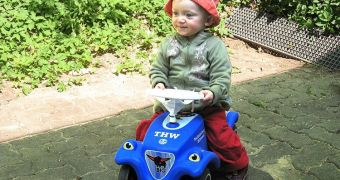According to the conclusions of a new scientific investigation by researchers at the University of California in Berkeley (UCB), it would appear that infants and very small children are able to reason abstractly, and to infer the existence of relationships between objects. This becomes very difficult to do once they reach the age of 5.
For this research, the team analyzed differences in how infants and 5-year-olds relate to the world around them. The human brain again surprised the investigators, revealing a series of complex capabilities at just 18 months. These abilities slowly decay for a while, before returning later on, NPR reports.
One of the reasons for this decay in brain capabilities, the team says, is that older children have a tendency to get caught up in the concreteness of things. This prevents them to inferring relationships between objects with a high degree of accuracy, while also impairing abstract thought.
Since 18-month-olds cannot perceive things concretely, their mental abilities are not impaired. In a series of experiments conducted at UCB, the team determined that infants just 1.5 years old were able to figure out the relationships between differently-colored blocks.
“Older kids tend to be really bad at analogies. Learning may actually harm these kids' abilities to do abstract reasoning,” says UCB cognitive development graduate student Caren Walker, the leader of the research effort. Details of the work were published in the latest online issue of the journal Psychological Science.
According to the expert, older children have a tendency to focus their attention on the objects they are seeing, rather than on the potential relationships that exist between these items. Infants do not exhibit this tendency.
In this study, researchers showed infants colored blocks before placing pairs of them on a music box. The box would play a tune every time two blocks of the same color were place on top of it. After just 3 tries, infants began helping researchers select the correct blocks for playing the tune.
These capabilities, at just 18 months, were significantly more complex than those of primates. Previous experiments attempted to check how these mammals react to the color box test, but researchers could not get a conclusive answer.

 14 DAY TRIAL //
14 DAY TRIAL //